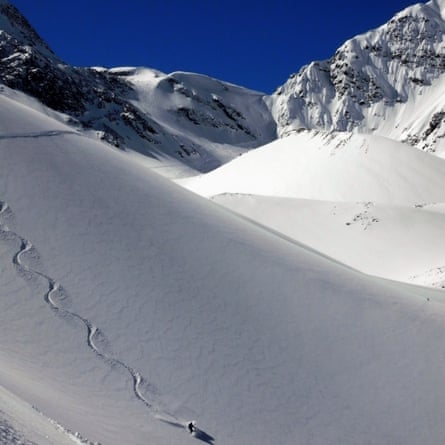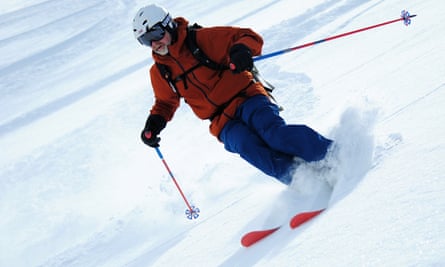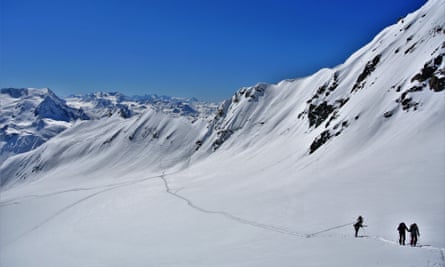
I’m skiing in the heart of France’s Haute Tarentaise region, surrounded by some of the biggest and best-known ski resorts in the world – to the west I can see the chairlifts of the huge Paradiski area (Les Arcs and La Plagne), to the south are Tignes and Val d’Isère, immediately north are the slopes of La Rosière, and beyond a high ridge to my left is the small ski resort of Sainte-Foy.
Yet other than my friend Hugh there’s not a soul to be seen nor a sound to be heard, other than the tinkling of a mountain stream beneath the snow. That’s because we are ski touring a little-known valley that forks off from the Isère and, despite the close proximity of all these ski resorts and the thousands of skiers careering down their slopes, it feels like we’re a million miles from lift-assisted skiing.
Ski touring is the ideal way to escape the hullaballoo of normal ski resorts, especially over half-term, when you’re likely to spend as much time standing in lift queues as actually skiing. By clipping into our touring skis, Hugh and I are experiencing this corner of the Haute Tarentaise pretty much as it would have been before any resorts were built.
And in the past couple of years there’s been a big growth in the sport’s popularity, largely as a result of the pandemic, when, with ski lifts and ski resorts either closed or operating limited services for two seasons, this was often the only way skiers could access the mountains.
We make our way up between pines and firs, cool and blue-shadowed in the morning light, eventually emerging into sunshine as we pass quietly through a small hamlet deserted in the winter (it will be occupied again once the snow melts. In places the snow, which glitters in the low winter sunlight, almost reaches the eaves of some of the buildings. As we ascend, the trail becomes steeper and more sinuous, and we stop to enjoy the view over a flask of coffee. Hugh’s preference is vin chaud, but we’ll save that until later …
The dominating feature of the landscape is 3,779-metre Mont Pourri, which rises into a cloudless winter sky between Les Arcs and Tignes. Spectacular, turquoise-blue glaciers tumble down from its summit, while the lower slopes are dotted with mountain refuges that allow ski tourers to stay out for one or more nights as they explore the quiet north-facing slopes.
To the right of Mont Pourri, I can see Les Arcs’ high point, Aiguille Rouge, and its cable car station. Two more different ski environments would be hard to imagine – Mont Pourri is as wild as it’s been since the ice age (albeit with considerably less snow and ice), while Aiguille Rouge sits above a winter playground visited by hundreds of thousands of skiers every year.
The easy tour Hugh and I are doing today can be enjoyed by pretty much any competent skier with a decent knowledge of mountain and avalanche safety. Our destination is the Refuge du Ruitor, in a high alpine valley close to the Italian border. We’ll stay there overnight and decide tomorrow where to head on our skis, but it won’t be anything too technical as we’d need a mountain professional for that.

One such professional is Jocelyn “Floss” Cockle from Freeflo Ski, who is based in the hamlet of Le Planay beneath Les Arcs. Floss has spent 11 years leading and coaching skiers in the Tarentaise mountains.
“It’s an amazing alpine environment with so many hidden secrets and little gems; I’m still discovering new routes and there are enough here to last a lifetime,” she says. Floss’s favoured routes depend on the weather, the time of year, the state of the snowpack and her clients’ ability. “I particularly like to base myself in the Refuge de la Femma in the Vanoise national park. It’s only a couple of ridges away from Val d’Isère and Tignes, but a world away in terms of peace and quiet – you may even see a lammergeier, or bearded vulture, while ski touring there, and the refuge has the advantage of having showers, unlike many.
“With a good snowpack, there are many spectacular gorges in the Tarentaise where you can enjoy some beautiful ski touring. There’s the opportunity to ski over the border into Italy, easily accessed from La Rosière, but there are several other quieter routes.”
The trail Hugh and I are following provides a number of access points into Italy, where refuges such as Rifugio Mario Bezzi above Valgrisenche provide overnight accommodation beneath towering rock walls and glaciers.
As we stop for another break before entering the high valley where Refuge du Ruitor sits, we decide that next time we come up here we will employ Floss or one of her colleagues to explore one of the more challenging routes. But for now, there’s Hugh’s vin chaud to take care of …
Freeflo Ski offers a variety of ski-touring courses starting from €537 for five half-days for intermediate skiers with off-piste experience who have done little or no ski touring. Clients provide their own ski touring equipment but avalanche safety gear can be rented
Floss’s ski-touring tips

Always match the weather and snow conditions to a route – accidents happen when you insist on skiing a particular route or summit irrespective of the conditions.
Ensure all the members of your group have the ability and fitness to tackle the route.
Ensure you have enough time to complete the route safely, and have exit options.
Contact the refuge before you go to check availability and snow conditions.



